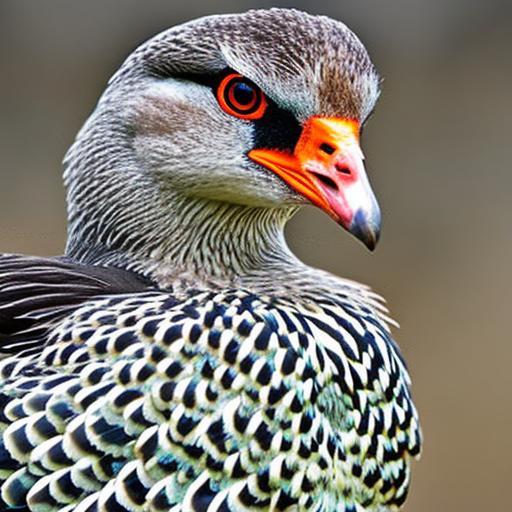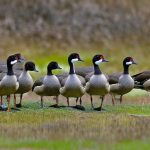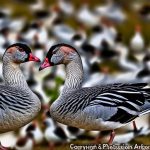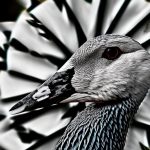Using geese to keep hawks away is a concept that has gained increasing popularity among farmers and gardeners. Geese are known for their natural instincts to protect their territory and deter predators. This article will explore the effectiveness of geese in deterring hawks, as well as their role in creating a safer environment for other animals. Additionally, we will discuss the benefits and drawbacks of using geese as a natural predator control method.
Key Takeaways
- Geese are natural protectors of their territory and can be trained to recognize and deter predators like hawks.
- Geese are effective in keeping hawks away from farms and gardens, making them a natural predator control method.
- Geese have a natural instinct to deter predators in the wild, making them a reliable option for protecting livestock and crops.
- While geese can be trained to recognize and deter hawks, relying solely on them may not be enough to keep all predators away.
- Other natural predator control methods can be used in conjunction with geese to provide a more comprehensive approach to protecting livestock and crops.
The natural instincts of geese
Geese are naturally protective of their territory and will go to great lengths to defend it. They have a strong sense of loyalty to their flock and will use their honking and aggressive behavior to deter predators. When a hawk or other predator approaches, geese will often honk loudly and flap their wings in an attempt to scare them away. They may also charge at the predator, using their sharp beaks and strong wings to fend off any potential threat.
The role of geese in deterring predators in the wild
Geese have been observed deterring predators in the wild, creating a safer environment for other animals. For example, in wetland areas, geese will often nest near other bird species, such as ducks or swans. Their presence acts as a deterrent to predators like foxes or raccoons, who are less likely to approach an area with a large flock of protective geese. This allows other bird species to nest and raise their young in a safer environment.
The effectiveness of geese in keeping hawks away from farms and gardens
Using geese to deter hawks has proven to be an effective method for many farmers and gardeners. Statistics and anecdotes show that geese can successfully keep hawks away from crops and livestock. For example, a study conducted on a farm in California found that the presence of geese reduced hawk attacks on chickens by 80%. Farmers have also reported a decrease in crop damage caused by hawks when geese are present.
In addition to being effective, using geese as a natural predator control method is also cost-effective and eco-friendly. Geese require minimal maintenance and can be easily integrated into existing farm or garden systems. They do not require the use of harmful chemicals or pesticides, making them a sustainable alternative to other predator control methods.
How geese can be trained to recognize and deter hawks
Training geese to recognize and respond to hawks can be a relatively simple process. It involves exposing the geese to hawk decoys or recordings of hawk calls, gradually increasing their exposure over time. This helps the geese develop an understanding of what a hawk looks and sounds like, allowing them to recognize and respond to potential threats.
For those interested in training their own geese, it is important to start with young goslings, as they are more receptive to training. Patience and consistency are key when training geese, as it may take several weeks or even months for them to fully understand and respond to hawk stimuli. Providing rewards, such as treats or praise, can also help reinforce the desired behavior.
The benefits of using geese as a natural predator control method

Using geese as a natural predator control method offers several benefits. Firstly, geese are low maintenance animals that require minimal care compared to other predator control methods. They are hardy and adaptable, able to thrive in various climates and environments. Additionally, geese have the ability to deter multiple types of predators, not just hawks. Their presence can help keep away other birds of prey, as well as ground predators like foxes or raccoons.
Furthermore, using geese as a natural predator control method creates a more natural and sustainable ecosystem. Unlike chemical pesticides or traps, which can harm other animals and disrupt the balance of the ecosystem, geese provide a non-toxic and environmentally friendly solution. They work in harmony with nature, allowing for a more balanced and sustainable approach to predator control.
The potential drawbacks of relying solely on geese to keep hawks away
While geese can be effective in deterring hawks, it is important to recognize their limitations. Geese may not be able to deter all types of predators, especially those that are more persistent or aggressive. Additionally, proper training and care are essential for geese to effectively recognize and respond to hawks. Without proper training, geese may not be able to differentiate between a real hawk and other harmless birds, leading to unnecessary aggression or stress.
It is also important to have a backup plan in case geese are not effective in keeping hawks away. This could involve using other natural predator control methods, such as scarecrows or predator decoys, in conjunction with geese. By combining different methods, farmers and gardeners can create a more comprehensive and effective predator control system.
Other natural predator control methods that can be used in conjunction with geese
In addition to using geese, there are other natural predator control methods that can be used in conjunction to create a more effective system. Scarecrows, for example, can help deter hawks by creating the illusion of a human presence. Predator decoys, such as fake owls or snakes, can also be effective in deterring hawks and other predators.
By combining these methods with the presence of geese, farmers and gardeners can create a multi-layered approach to predator control. This increases the chances of deterring hawks and other predators, creating a safer environment for crops and livestock.
The importance of understanding the behavior and habits of both geese and hawks
To create a successful predator control system using geese, it is important to understand the natural behavior and habits of both geese and hawks. This knowledge allows farmers and gardeners to effectively train geese and implement other predator control methods.
Resources such as books, online articles, and local agricultural extension offices can provide valuable information on the behavior and habits of geese and hawks. By educating themselves, farmers and gardeners can make informed decisions and create a predator control system that is tailored to their specific needs.
Conclusion and summary of the advantages and limitations of using geese to keep hawks away
In conclusion, using geese as a natural predator control method has gained popularity among farmers and gardeners due to its effectiveness, cost-efficiency, and eco-friendliness. Geese have natural instincts to protect their territory and deter predators, making them an ideal choice for keeping hawks away from farms and gardens. However, it is important to understand the limitations of relying solely on geese and to have a backup plan in case they are not effective.
By combining geese with other natural predator control methods, farmers and gardeners can create a more comprehensive and effective system. Understanding the behavior and habits of both geese and hawks is crucial in creating a successful predator control system. By considering the advantages and limitations of using geese, while also being aware of the importance of understanding these animals, farmers and gardeners can make informed decisions to protect their crops and livestock.
If you’re interested in learning more about how geese can help keep hawks away, you might also find this article on Poultry Wizard helpful. It discusses the importance of providing a secure coop for turkeys and offers valuable insights into their housing needs. Check it out here: https://poultrywizard.com/keeping-turkey/do-turkeys-need-a-coop/. Additionally, if you’re looking for tips on insulating a chicken coop to ensure the comfort and safety of your flock, this article provides step-by-step instructions: https://poultrywizard.com/keeping-chickens/how-to-insulate-a-chicken-coop/. And if you’re in the market for a new chicken coop, this article showcases ten different designs to inspire you: https://poultrywizard.com/keeping-chickens/chicken-coop-10/.
Meet Walter, the feathered-friend fanatic of Florida! Nestled in the sunshine state, Walter struts through life with his feathered companions, clucking his way to happiness. With a coop that’s fancier than a five-star hotel, he’s the Don Juan of the chicken world. When he’s not teaching his hens to do the cha-cha, you’ll find him in a heated debate with his prized rooster, Sir Clucks-a-Lot. Walter’s poultry passion is no yolk; he’s the sunny-side-up guy you never knew you needed in your flock of friends!







